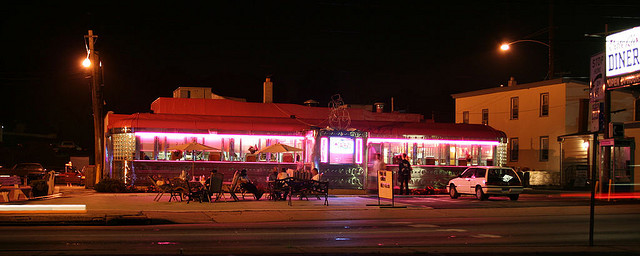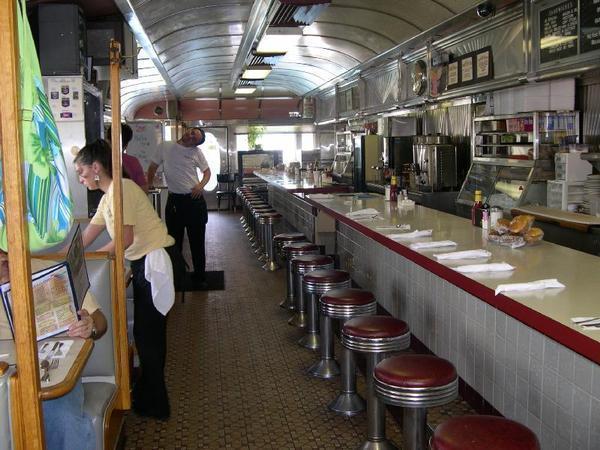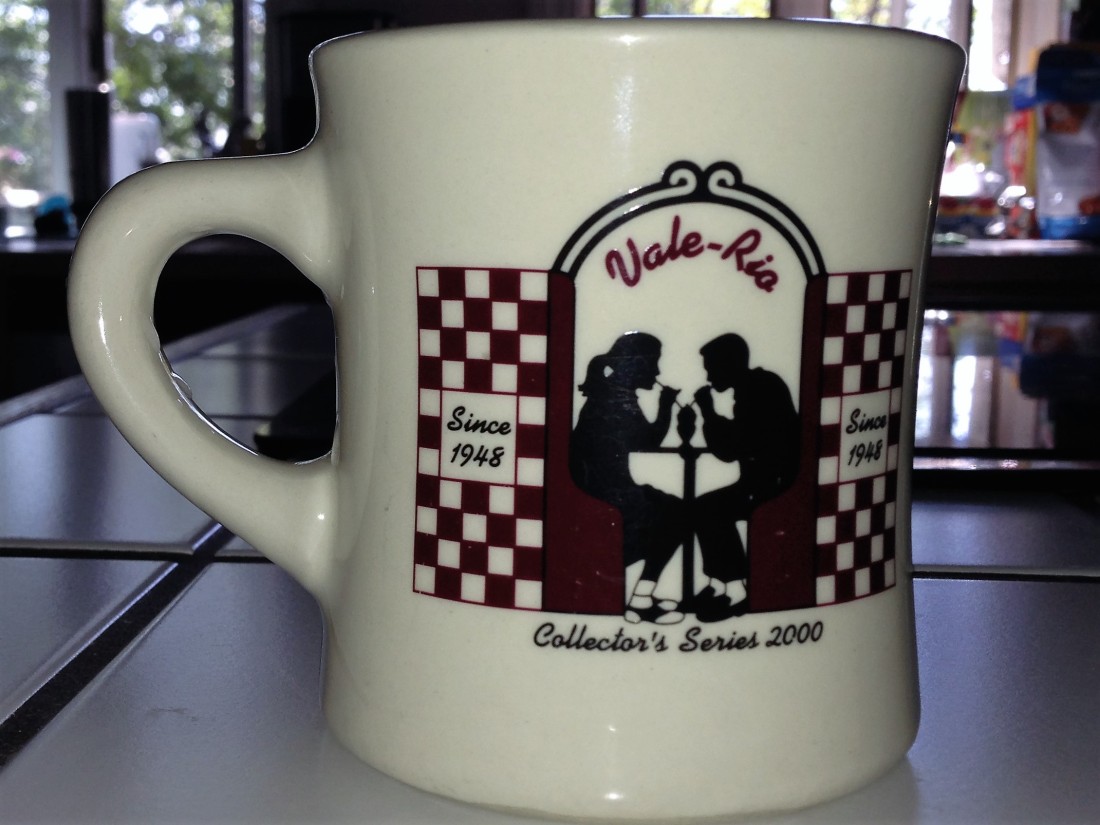I spent many nights in the liberated summer between high school graduation and enrolling at Yale taking long solo drives, exploring outer suburban Philadelphia. One night, meandering along Route 23, I saw this at the intersection with Route 113N in Phoenixville:

My idea of heaven was, and remains, a 24-hour diner, though less so when the sun is shining.

Nineteen years later, I moved to King of Prussia, Pennsylvania, a 30-45 minute drive northwest of Center City Philadelphia and home to one of the world’s largest shopping malls. Given the proximity of King of Prussia to Phoenixville, the Vale Rio Diner soon became a favorite late-night haunt[1].
The 20-or-so minute drive to the Vale Rio took me through beautiful Valley Forge National Historic Park. Before entering Valley Forge, I would drive by the King of Prussia Mall and the Valley Forge Casino Tower. Upon leaving Valley Forge, I would drive by the Freedoms Foundation at Valley Forge, what was then called the National Christian Conference Center and the local chapter of the Boy Scouts of America.
Growing up in suburban Philadelphia, I understood that I was living in between the Democratic, majority-minority city of Philadelphia and some of the most white rural/small town conservative parts of the state. Delaware and Montgomery Counties were Republican-dominated, to be sure, but it was a very moderate, northeastern brand of Republican.
Driving to the Vale Rio was thus literally crossing from one political and cultural milieu to its near-polar opposite.
**********
Just bear with me while I present polling data regarding American attitudes toward guns.
In April 2017, a CBS News Poll asked 1,214 adults, “In general, do you think laws covering the sale of guns should be made more strict, less strict, or kept as they are now?” Overall, a majority—54%—answered “more strict,” 33% answered “kept as they are” and 11% answered “less strict.”
Look more closely, however, and you see an unsettling partisan divide. While 73% of Democrats—and 51% of Independents—wanted more strict gun sale laws, only 38% of Republicans did. In fact, a plurality of Republicans (44%) wanted gun sale laws kept as they are now. And while few respondents wanted less strict gun sale laws, Republicans (16%) were three times more likely than Democrats (5%) to hold that position.
CBS News has asked a version of this question, and provided partisan breakdowns, since February 2013, a few months after the tragic shootings at Sandy Hook Elementary School. While specific percentages have ebbed and flowed, the pattern is constant: a large majority of Democrats, and a bare majority of Independents, favor more strict gun sale laws, while Republicans generally prefer to keep the laws as they are. Squint a bit, and you might see Republicans shifting toward more strict gun sale laws, a trend worth watching.
This partisan divide appears, often by wider margins, on similar questions:
- Safer with more guns or fewer guns?
- Most Republicans say “More guns”
- Most Democrats say “Fewer guns”
- Independents evenly split
- Banning assault weapons?
- Most Republicans say “No”
- Most Democrats say “Yes”
- Independents evenly split
- Stricter gun laws (without specifying “sales”)
- More Republicans say “Oppose”
- Even more Democrats say “Support”
- Independents lean towards “Support”
- Opinion of the National Rifle Association (NRA), of those with opinion
- Most Republicans say “Favorable”
- Most Democrats say “Unfavorable” (with higher % not sure)
- Independents evenly split
- Own a gun (self or in household)?
- Most Republicans say “Yes”
- Most Democrats say “No”
- Independents lean slightly “Yes”
- More worried you/someone you know will be victim of gun violence or terrorist attack?
- Republicans lean slightly “Terrorist attack”
- Most Democrats say “Gun violence”
- More Independents say “Gun violence”
- Allowing more teachers/school officials to carry guns in schools
- More Republicans say “Yes”
- Even more Democrats say “No”
- More Independents say “Yes”
- Which do you agree with more as way to prevent mass shootings, better gun regulation or more people carrying guns
- More Republicans say “More people carrying guns”
- Most Democrats say “Better gun regulation”
- More Independents say “Better gun regulation”
- What more important: to protect the right of Americans to own guns, or to control gun ownership?
- More Republicans say “Protect gun ownership rights”
- Most Democrats say “Control gun ownership”
- Independents evenly split
Still, just when you are about to throw up your hands and say gun policy divisions are unbridgeable, you find two gun-related policies supported by AT LEAST 73% of each partisan group:
- Requiring background checks for all gun buyers
- Opposing gun sales to persons on terrorist watch (“no-fly”) lists
Plus, at least 79% of surveyed Americans want to prevent convicted felons and persons with mental health problems from purchasing guns. And while partisan breakdowns were not provided for these polls, mathematically, majorities of each partisan group would have to support this policy[2].
**********
I would generally drive to the Vale Rio late on a weekend night, park myself at the counter with my book or magazine and enjoy a meal or a snack (I am a sucker for a heated slice of cherry pie with chocolate ice cream). The decaffeinated coffee occasionally left something to be desired, but there was always plenty of it.
One quiet night, probably in late 2003 or early 2004, the young man working the counter and I got to talking. That is the great thing about diner (or any restaurant, really) counters: they are highly conducive to starting conversations with total strangers. At least, that has generally been my experience.
This waiter was in his mid-to-late-20s. His slender frame, dirty blonde hair and scraggly beard made him resemble a Da Vinci painting of Jesus. He was soft-spoken and instinctually polite. He had recently lived in Florida, although he was local, having grown up a little further west, near French Creek State Park, where he still loved to hunt. I do not recall discussing his post-high-school education.
In other words, he was a product of the white conservative rural/small town culture I described earlier. I don’t recall discussing our respective partisan affiliations, but I would not be surprised if he had voted for Republican Donald Trump in 2016. I was, and remain, a liberal Democrat, as much a product of my urban-raised Jewish parents (and Ivy League schools) as of my moderate-Republican suburban neighborhoods.
During one idle chat, the conversation somehow turned to guns.
And a funny thing happened in that diner, on the border between the urban and rural areas of the state.
We simply talked to each other.
We must have been discussing the notion of banning handguns from crossing large city lines, because he said something to the (paraphrased) effect of:
I collect guns, legally. But what if one night I drive through Philadelphia[3] on my way home from a gun show with my newly-purchased guns in my trunk? Simply by crossing that city line, even with no intention of doing anything with those guns in the city, I would be in violation of the law.
That stopped me in my tracks.
I had never really thought about the legitimate transport of guns by individual, responsible collectors and owners before, probably because I never saw any guns in my suburban milieu.
But then I observed that gun control activists don’t want to take everyone’s guns away from them. They…we…are simply trying to reduce urban gun violence (mass shootings and domestic terrorism were not as prevalent then). You may not be contributing to this violence, but other bad actors do bring guns into the city, perpetuating gun violence. And they need to be stopped.
That stopped him in his tracks.
My sense was that he had never really looked past his stereotype of Philadelphia-as-Gotham long enough to consider the people who live (and die) there.
There was probably more, but here is the point: the suburban liberal public health advocate for gun control got to see gun rights through the eyes of a responsible gun collector and hunter, while the rural conservative gun collector and hunter got to see gun control through the eyes of a suburban liberal public health advocate.
Fancy that.
**********
My wife and I will celebrate our ten-year wedding anniversary this October. Marriage, I have discovered, involves a series of lessons in communication and understanding.
One such lesson is that my wife cannot hear anything I say in a voice raised in anger or frustration or sheer excitement. The volume drowns out the substance.
This lesson applies also to my daughters, especially my younger daughter. When Daddy yells, the message is lost.
I should have known better, but I grew up with a loud and boisterous extended family (although, I cannot now remember my father raising his voice very often, if at all). Shouting was simply the easiest way to be heard in the passionate, talking-over-each-other mode of communication we utilized.
Whether any of us actually HEARD each other remains an open question.
**********
About a year after I met and befriended this waiter, he left the Vale Rio; I have no idea where he is now. In the fall of 2005, I returned to Boston, though I still visited Philadelphia a few times a year.
It became my habit to drive out to the Vale Rio during my stay, if I could.
One night in August 2008, I did just that. I drove through Valley Forge National Historic Park, past Route 252, past the Freedoms Foundation and the National Christian Conference Center and the Boy Scouts headquarters, past the waterfall, past Route 29, past the Phoenixville Hospital and the Phoenixville Morris Cemetery, around and down the bend in the road as it approaches the intersection with Route 113 north, and I saw…
…a brand new Walgreens where the Vale Rio had been.
“Heartbroken” does not begin to cover my reaction.
**********
The town of Brookline, Massachusetts, just east of Boston, gave 84.9% of its vote to Democrat Hillary Clinton in the 2016 presidential election.
Suffice to say that Brookline sees itself as a progressive enclave.
Situated on Harvard Street, in Brookline’s Coolidge Corner, the “Hub of Brookline,” is a terrific, family-friendly (albeit with a delectable house pinot noir) restaurant called Zaftigs. Zaftigs is a short walk from Beals Street, where you will find the house where President John F. Kennedy was born. More recently, I have seen President Kennedy’s grandnephew, current Democratic Congressman Joe Kennedy III (MA-4), holding meetings in a quiet back booth at Zaftigs. I introduced myself once and found him to be approachable, earnest and utterly likeable.
I have spent countless hours sitting at the counter at Zaftigs, eating and chatting amiably with the remarkably friendly wait staff.
One morning in the fall of 2016 I listened (there are only seven or eight chairs at the counter) as another regular discussed the impending presidential election with a waiter. While both loathed Trump, they reserved a particularly bitter opprobrium for Ms. Clinton.
This being Brookline, however, their contempt was coming from the LEFT. As I understood it, they felt that her husband, former president Bill Clinton, had betrayed progressive principles by governing too much from the center, and Ms. Clinton was no better. They were particularly incensed at the paid speeches she had given to Goldman Sachs, believing this made her a pawn of Wall Street.
Despite my own complicated feelings about Ms. Clinton (I voted for Bernie Sanders in the 2016 Massachusetts Democratic presidential primary, then voted for Ms. Clinton in the general election), I gently came to her defense, arguing that she was clearly the better choice if you wanted to advance any sort of progressive agenda: the classic “half a loaf is better than no loaf” argument.
I also pointed out that Trump posed such a clear and present threat to the nation’s existence that he needed to be stopped, full stop.
No, came the forceful response (again, I paraphrase), what good are principles if you don’t stick to them, if you simply abandon them for political expedience. I don’t like Trump, and I don’t like Clinton, and I refuse to vote for either of them.
Sure, I argued back, annoyed by his arrogant self-righteousness, you have to start with principles, but there also has to be some give and take. It only occurred to me later to argue that if we all followed his “position-absolutist” argument, nothing would ever get accomplished.
Eventually, the conversation fizzled out, and we each returned to my food and whatever we had brought to read.
The exasperating irony is that we probably agreed with each other—and with Ms. Clinton—on the vast majority of “principles.”
**********
The polling data cited above reveals that with, few exceptions (background checks; keeping guns from suspected terrorists, convicted felons and those with mental illness), Democrats, Republicans and Independents see the same world through different lenses, preventing collective action that protects responsible gun owners AND dramatically reduces gun violence.
At the same time, my own views on gun ownership are subtly shifting. One result of my strong interest in the gangsterism resulting from Prohibition is a deep fascination with the Thompson submachine gun, also known as the tommy gun, the Chicago typewriter and the chopper. Periodically, I half-jokingly ask my wife if she will get me one for my birthday or some other worthy occasion. Her response is always a firm “no.”
Also, my maternal grandfather served as a Philadelphia police officer[4], eventually rising to Detective, for 20+ years. My aunt still has his service revolver (his badge sadly went missing after his death in 1978). It is sweet irony that I, a staunch gun control advocate, would love to inherit that service revolver someday.
**********
The Vale Rio Diner no longer sits at the intersection of Route 23 and Route 113N, while Zaftigs just celebrated its 40th anniversary.
Two very different encounters in those two very different eateries leave me with this question: When do you stick to deeply-held principles, and when do you set them aside to advance the common good?
The answer may something to do with lowering your voice, listening to other points of view and questioning your own certainty.
Until I find the answer, I have this treasure to sustain me.


Until next time…
Photographs of Valerio Diner taken from
https://www.bing.com/images/search?view=detailV2&ccid=SPCXSWsn&id=74A575D1FD4989A6EB2FA9E141DDE40D0418237D&thid=OIP.SPCXSWsnhQp9Ehwp_rwNFAEsB4&q=vale+rio+diner&simid=607985951386700322&selectedIndex=13&ajaxhist=0
Source: https://www.bing.com/images/search?view=detailV2&ccid=NP76TyhP&id=2DCBC7BB3CA5955AAEF7E257CC35C0E8FE03C54F&thid=OIP.NP76TyhPX8nTviWbuP2V5gEsDh&q=vale+rio+diner&simid=608014091991057299&selectedIndex=7&ajaxhist=0
[1] I would be remiss if I did not give a shout out to the superb Minella’s Diner (Wayne, Pennsylvania) and the charmingly-anachronistic (Friday night karaoke!) Limerick Diner (Limerick, Pennsylvania).
[2] Nonetheless, one of the few major pieces of legislation passed by this Congress (February 28, 2017) overturned an Obama Administration regulation preventing certain mentally ill people from purchasing guns. Public opinion is not always the force we presume it to be.
[3] The disdain in his voice when he drawled “Philadelphia” spoke volumes.
[4] Late in his career, my grandfather was partnered with a rookie police officer named Frank Rizzo, whom he despised. Rizzo would go on to serve as a highly controversial and racially-divisive Philadelphia Police Commissioner (1967-1972) and Mayor (1972-1980).

16 thoughts on “Two distinct restaurants. Two different conversations. One unanswered question.”